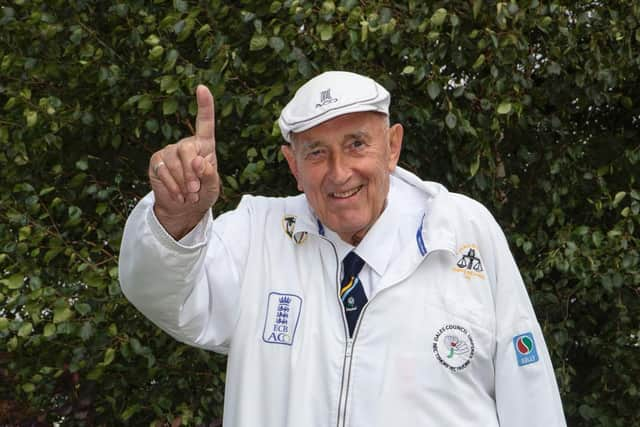Leeds cricket umpire with 70 years experience returns to pitch with new shoulder - to allow him to signal a six
and live on Freeview channel 276
Keith Dibb, 86, feared his cricket umpire days might be over after a pain in his shoulder became so severe, he couldn't lift his arms above his head.
A wide range of cricket signals are linked to arms raised above the head, so Keith believed it was vital he could do the same.
Advertisement
Hide AdAdvertisement
Hide AdAfter a long run of more than 70 years of experience in cricket, Keith said he wasn't ready to hang up his coat.


The problem started three years ago and gradually worsened.
Keith’s GP referred him to Mr Roger Hackney, consultant orthopaedic surgeon at Spire Leeds Hospital as an NHS patient.
Keith, a widower and grandad of four from Leeds, is now able to return to the game following pioneering 'reverse total shoulder replacement surgery'.
He said: "Umpires need to use a range of arm signals to communicate scores.
Advertisement
Hide AdAdvertisement
Hide Ad"It was extremely difficult to signal a ‘six’ which involves raising both arms straight above the head.
"The tendons in both shoulders had deteriorated with age-related wear and tear and it was extremely painful and also affected my sleep."
Keith won the Dales Council League’s Umpire of the Year twice in 2003 and 2005 and was made a life member of the same League in 2010 for his services to umpiring.
He was desperate to return to the game.
He continued: "Mr Hackney performed surgery on a fractured humerus a few years ago for my late wife, Margaret and when we attended the consultation, he remembered us straight away.
Advertisement
Hide AdAdvertisement
Hide Ad"Mr Hackney found the tendons on both shoulders were damaged, but we decided to do the left shoulder first as that was the most painful."
Keith underwent a total reverse shoulder replacement in January 2019.
The operation takes just under an hour, usually with a one to two-night stay in the hospital.
It was followed by a physiotherapy treatment programme at Spire.
Advertisement
Hide AdAdvertisement
Hide AdMr Hackney said “This surgical procedure is not so well known among GP’s or the general public.
"A Total Shoulder Reversal shifts the centre of rotation back towards the normal position and enables the deltoid muscle to act more efficiently.
"A French orthopaedic surgeon, Professor Paul Grammont, realised that in order to restore function to a rotator cuff deficient shoulder, the centre of rotation of the shoulder joint needed to be shifted.
"So he designed this method which reverses the mechanics of a standard shoulder replacement, moving the ball to the socket side and the socket to the ball, hence reverse total shoulder replacement.
Advertisement
Hide AdAdvertisement
Hide Ad"His design has been further developed and the procedure is now being used more and more frequently with excellent results.
"In Keith’s case, he wanted more movement than most patients can achieve.
"His outcome has enabled remarkably good movement, with no pain. Most importantly for him he can signal a six!”
Two days after the operation Keith was able to return home and was delighted that he could raise his arm again without pain.
Advertisement
Hide AdAdvertisement
Hide AdHe added: “Spire is like a five-star hotel. The staff really looked after me!
“I feel very lucky!
"I thought it might be the end of my umpiring days, but Mr Hackney at Spire gave me a new shoulder and put me back together again.
"I’m in a very fortunate position, being able to continue doing something I love and it’s great to be involved in cricket once again.
"I don’t intend to give it up anytime soon.”
Comment Guidelines
National World encourages reader discussion on our stories. User feedback, insights and back-and-forth exchanges add a rich layer of context to reporting. Please review our Community Guidelines before commenting.